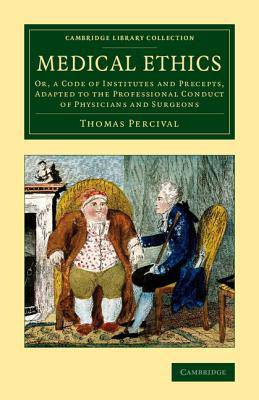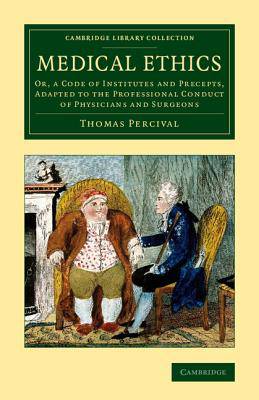
Je cadeautjes zeker op tijd in huis hebben voor de feestdagen? Kom langs in onze winkels en vind het perfecte geschenk!
- Afhalen na 1 uur in een winkel met voorraad
- Gratis thuislevering in België vanaf € 30
- Ruim aanbod met 7 miljoen producten
Je cadeautjes zeker op tijd in huis hebben voor de feestdagen? Kom langs in onze winkels en vind het perfecte geschenk!
- Afhalen na 1 uur in een winkel met voorraad
- Gratis thuislevering in België vanaf € 30
- Ruim aanbod met 7 miljoen producten
Zoeken
Medical Ethics
Or, a Code of Institutes and Precepts, Adapted to the Professional Conduct of Physicians and Surgeons
Thomas Percival
€ 77,45
+ 154 punten
Omschrijving
A physician and medical reformer enthused by the scientific and cultural progress of the Enlightenment as it took hold in Britain, Thomas Percival (1740-1804) wrote on many topics, but he was particularly concerned about public health issues arising from the factory conditions of the Industrial Revolution. Calling for improved standards of care, he believed that the working poor should be treated the same as wealthy private clients. Following a disastrous dispute in 1792 which closed the Manchester Infirmary's Fever Hospital during an epidemic, Percival was asked to draft regulations on professional medical conduct. In 1794 he privately circulated a tract, Medical Jurisprudence, which he later revised for this 1803 publication. Based on Hippocratic and Christian principles, Percival's work is considered the first modern formulation of doctor-patient etiquette. His Essays Medical and Experimental (revised edition, 1772-3) and the four volumes of his collected works (1807) are also reissued in this series.
Specificaties
Betrokkenen
- Auteur(s):
- Uitgeverij:
Inhoud
- Aantal bladzijden:
- 266
- Taal:
- Engels
- Reeks:
Eigenschappen
- Productcode (EAN):
- 9781108067225
- Verschijningsdatum:
- 17/07/2014
- Uitvoering:
- Paperback
- Formaat:
- Trade paperback (VS)
- Afmetingen:
- 140 mm x 216 mm
- Gewicht:
- 340 g

Alleen bij Standaard Boekhandel
+ 154 punten op je klantenkaart van Standaard Boekhandel
Beoordelingen
We publiceren alleen reviews die voldoen aan de voorwaarden voor reviews. Bekijk onze voorwaarden voor reviews.









